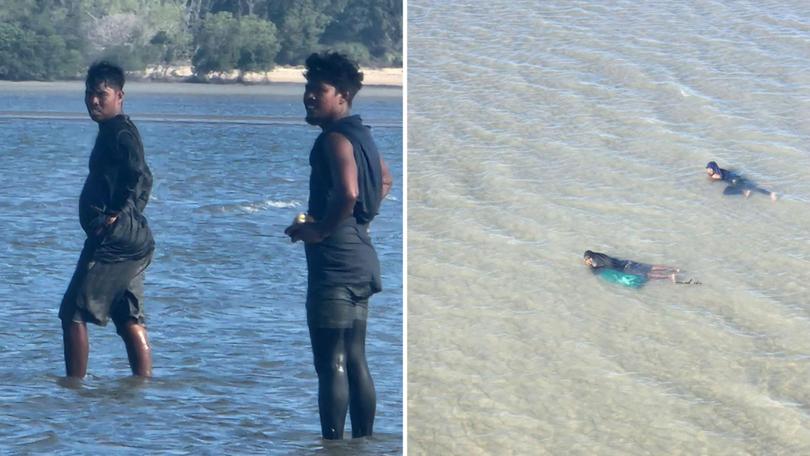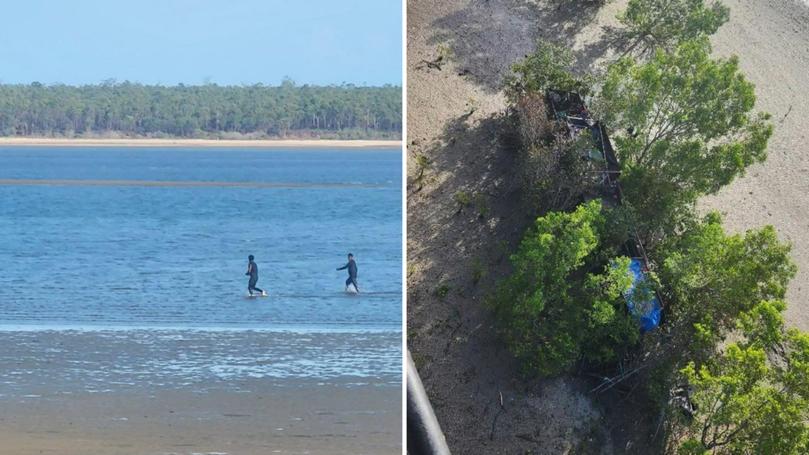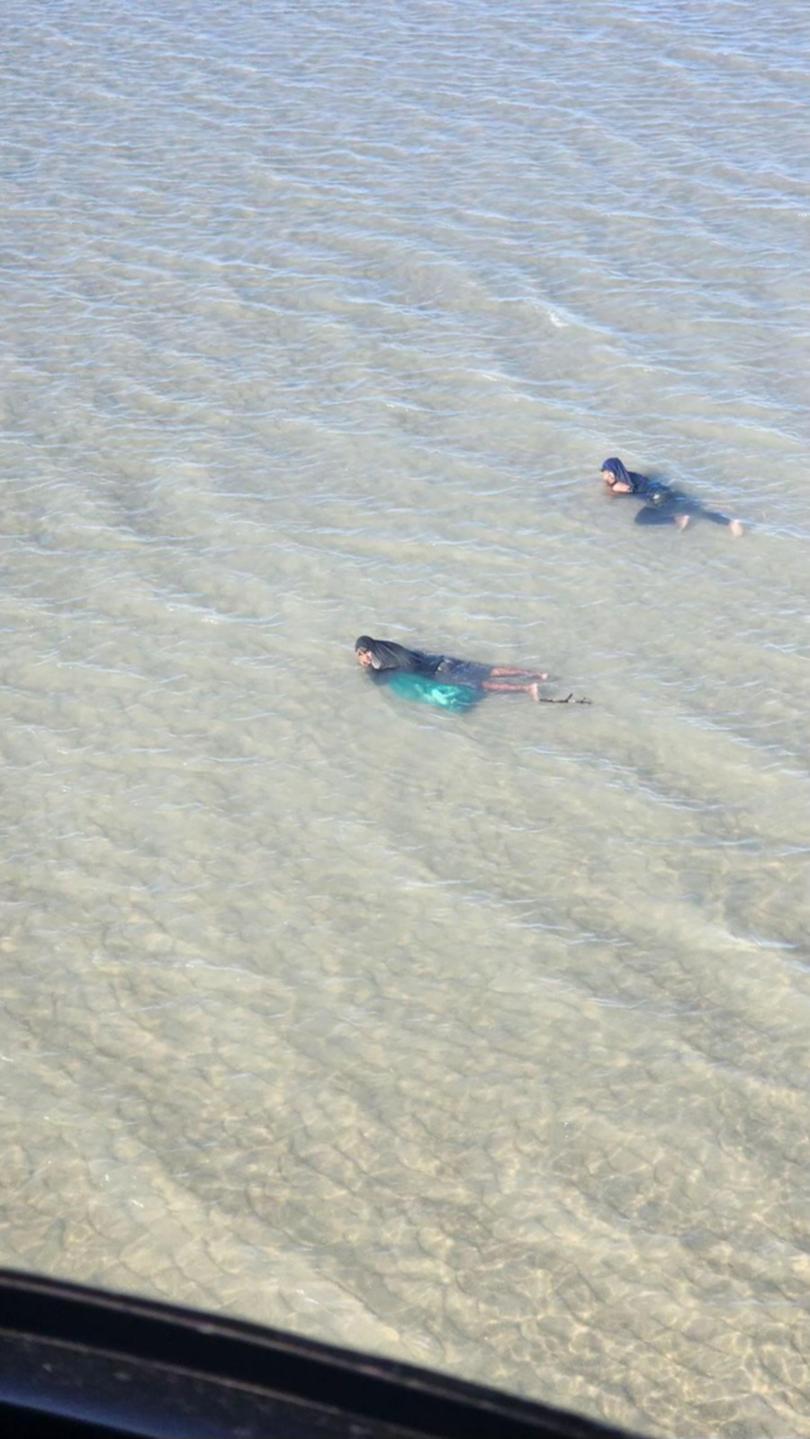Pictures show Indonesian fishermen risking lives in croc-infested NT waters to illegally collect sea cucumbers
Incredible photos taken on Thursday afternoon show Indonesian fishermen swimming through shallow, croc-infested waters at West Arnhem Land in the Northern Territory.

Foreign fishermen are literally risking life and limb to illegally plunder sea cucumbers from croc-infested Australian waters.
Incredible photos taken on Thursday afternoon show two Indonesian fishermen swimming through shallow water to collect the sea creatures at West Arnhem Land in the Northern Territory.
Foreign fishing vessels were photographed in mangroves at Rolling Bay near the coastal community of Maningrida. Bawinanga Rangers were conducting a coastal survey by helicopter at the time.
Sign up to The Nightly's newsletters.
Get the first look at the digital newspaper, curated daily stories and breaking headlines delivered to your inbox.
By continuing you agree to our Terms and Privacy Policy.Sea cucumbers, also known as trepang, are regarded as a delicacy in many Asian nations and Indonesians are taking huge risks to collect the species from remote Australian waters where they are understood to remain abundant.
For Indonesian fishermen, a large haul could be worth thousands of dollars.
A report from the Australian Centre for International Agricultural Research said the dried form, called ‘beche-de-mer’, is a luxury food item in Asian cultures and part of Chinese traditional medicine with the price of sea cucumber steadily rising.
Some species of these bountiful sea treasures are sold in Chinese markets for thousands of dollars per kilogram.
Last month, 13 Indonesian nationals, intercepted off Cobourg Island in northwestern Arnhem Land, faced court.
Investigators from the Australian Fisheries Management Authority had intercepted the men and directed them to leave Australian waters but they then returned.

On October 11, the Royal Australian Navy intercepted the returning vessel.
They have since appeared in the Darwin Local Court where they were all fined and warned that they would go to jail if caught fishing in Australian waters again.
Also in mid-October, the Australian Border Force caught seven illegal foreign fishing boats off the NT and Western Australia.
The ABF’s Maritime Border Command caught three boats north of Broome — one at Barracouta Shoal and two at Cartier Island — on October 14.
On the same day, seven fishers were intercepted within the North Kimberley Marine Park and six fishers were caught at Trepang Bay — northeast of Darwin.
The next day, two more boats — one north of Broome at Ashmore Island and another northeast of Darwin at Croker Island — were caught.
Pilots in the NT told The Nightly they have seen at least seven illegal fishing boats off the NT coastline in the last two months.

The Northern Land Council also recently claimed there had been a surge in illegal fishing boats exploiting the area.
In a statement published in the NT News, the NLC called for greater border protection amid fears of disease threats.
“There is a need to step up effort to protect Australian coastline, which in the NT is 85 per cent Aboriginal-owned land,” it said.
“The biosecurity risks to Australia are significant. With Indonesian outbreaks of lumpy skin and foot and mouth disease, incidences like this pose an incredible threat to local industries.
“If these diseases were to enter Australia it would greatly impact livelihoods and cost the Australian economy billions of dollars.
“Additionally, the risks to human health from increased foreign fishing vessels is concerning, with monkeypox, tuberculosis and the potential for rabies real threats to our communities.”
Back in August, 33 fishermen were stopped by the ABF near Augustus Island in northwest Western Australia.
Officers seized 700kg of sea cucumber, 2350kg of salt (for processing), 4kg of shark fin, 4kg of sea urchin, and a large quantity of fishing equipment.
AFMA said there was a total of 22 apprehensions and 75 Indonesian fishermen prosecuted in the last financial year.
In December last year, the ABF apprehended 30 illegal foreign fishers and seized and destroyed three fishing vessels as part of an ongoing operation targeting illegal fishing off the coast of Western Australia.
ABF’s Maritime Border Command along with the Australian Fisheries Management Authority detected and apprehended the vessels found to be fishing illegally in the Kimberley Marine Park in late December.
Their fishing equipment was seized from the vessels and a combined catch of more than a tonne of trepang (1,170 kg), otherwise known as sea cucumber, as well as 600kg of salt, which is used to preserve the trepang.
“If you fish illegally, you will lose your vessel, your equipment and you will be placed in immigration detention to face potential prosecution in Australian courts,” Assistant Commissioner Kylie Rendina said at the time.
In response to questions, ABF said it does not comment on operational matters.

